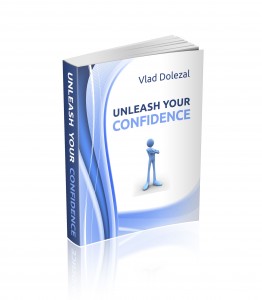Unleash your confidence

People know I feel that confidence is an absolutely crucial part of generally improving your life and especially for being able to speak languages well, but it's been pointed out that I have a somewhat insensitive way of telling people to be more confident.
I feel that the slap-in-the-face approach of telling people not to be crybabies and to stop creating self-fulfilling prophecies and just bloody stop being shy. I bluntly tell people to get over it. Sometimes thinking too much about it leads to “paralysis by analysis”, and keeping this in mind is how I simply managed to improve many aspects of my life.
As you can imagine, many people say it isn't as easy as “just not thinking about it”, and this is why today I'm happy to share something that a friend of mine has been working on, which can be a much more helpful guideline to really Unleashing your confidence.
Note: I'm using an affiliate link to Vlad's book in this post, so if you decide to get a copy by clicking my link, both Vlad and myself will earn from it, but the price is the same.
Otherwise, even if you are not interested in buying his book, his advice in this post (especially answers to questions 4 & 5) and on his site is quite clever and worth a read!
Vlad Dolezal on Unleashing your confidence
Vlad Dolezal is actually the first person I ever spoke Esperanto to, and we've met several times since then. He has an amazing positive outlook on life, is fun company, writes a cool blog and experiments on and experiences many cool things in life.
Confidence is a key factor for the reason he can do so much. He is also a life coach and helps people gain confidence for a living, so the book that he is releasing in electronic form this week entitled “Unleash your confidence” is based on advice that has worked very well for his clients and blog readers.
When he told me he had written a book, I was glad to read through it and actually found very clever ideas within it that I'll be happy to reiterate to people myself in helping them to find confidence that they already have.
I had a few follow up questions for Vlad, and his answers are the bulk of this post:
1. Could you give us a quick summary of what you talk about in “Unleash your confidence”?
In the book, I explain exactly what is confidence (more on that in a second), and why so many people struggle with it.
Essentially, it comes down to a miscommunication between your conscious and unconscious minds. The outdated psychology of your unconscious mind incorrectly interprets certain situations as a threat to your survival, and kicks in with powerful emotions to stop you from going any further. (Just like it will stop you from doing handstands at the edge of a tall building, which is a good thing of course!)
In the book, I give several powerful techniques that will bridge the gap between your unconscious mind and your conscious mind, and help you get the point across to your unconscious mind which situations really are dangerous, and which are just threatening to your ego.
2. Any thoughts on situations where my blunt advice simply isn't good enough?
You might not want to hear this, Benny, but that would be just about every damn situation. Most people don't lack confidence because they need someone to come and kick their ass. If you shout at someone “BE CONFIDENT!”, they won't suddenly turn around and say “Well, now that you say it in a loud voice, I think I'll do that. Here, I feel completely confident now!”
People lack confidence because they don't know how to go about unleashing it. That's why I don't spend any rhetoric in my book on why you should be confident. You already know why you want to be confident. Instead, I give you a heap of powerful tools to help you achieve exactly that.
3. Will someone instantly be confident after reading your book?
Well, that depends on what you mean by “reading” and by “instantly confident”.
If a person expects to just read through the book, not do any of the exercises, then close the book and suddenly feel completely confident, then no. That won't happen.
If a person reads through the whole book and does all the exercises once, that will help them feel more confident straight off, but that's not the same as feeling instantly confident forever.
The book offers a lot of powerful tools. But it takes repeated use and practice to apply them in all the right situations and feel confident in any situation you want. And when a new unfamiliar situation comes up, you might need to apply them again. That's how confidence works.
4. I loved what you said about the “Movies in your mind”. Could you give us an example of how I could apply this if I am introduced to a native speaker of my target language, for example, and feel lack of confidence about my level not being good enough yet to bother them with it?
Here's a quick summary of the ideas from that chapter – when thinking about a situation, you automatically make movies in your mind that represent the situation. These movies completely determine how you feel about the situation. In fact, let's try that right now so you see what I'm talking about:
Imagine that you've been invited to a party. You're still deciding whether or not you will go.
First, imagine standing awkwardly in a corner, surrounded by people you don't know and have nothing in common with. Your least favourite type of music is playing way too loud in the background. How much do you want to go to the party, on a scale from 1 to 10?
Now instead imagine standing there comfortably, surrounded by people who are interested in spending time with you. Your favourite type of music comes on in the background at just the right volume. How much do you want to go to the party now?
Go ahead, do the exercise now.
…
Did you feel a difference there?
If you felt any difference at all, you can see how the images you make in your head affect your decisions. Even this simple 30-second exercise changed how you felt about going to a friend's party. The situation was the same in both cases, but your mental movie of the situation determined how you felt about it.
Now, how would that apply to the situation you mentioned?
The first thing you would want to do is run the situation past your conscious mind. Only when you've decided that there really is no good logical reason to shy away from the situation, that's when you turn to tweaking your emotions.
In this case, you would determine what movie you picture in your mind when you imagine talking to a native speaker of the language. Chances are, it's a rather unhelpful movie, possibly involving them being angry and annoyed with you for wasting their time. Or freezing up and ending up with an endlessly awkward silence. Or something like that.
Then you would pick a mental movie that you would like instead. One that fills you with confidence and gets you excited about talking to native speakers.
Then you would go through a process that involves playing with how you imagine the movies, instead of just the content, and in some 10-20 minutes get yourself to a point where any time you think about talking to a native speaker, you automatically think of the positive mental movie rather than the negative one and feel a surge of confidence. But I honestly don't have the space to get into that process in detail here. That's why I wrote a whole book about it. (And yes, this is all just one chapter of the book).
5. Any closing thoughts for how language learners could work on improving their confidence?
I think the easiest concept from my book to understand without long explanations is taking gradual action.
In essence, you think about the final situation you want to be comfortable with. Let's say having an extended conversation with a native speaker of a language you're trying to learn, in their own language, in their own country.
If that's too scary for you at the moment, you can build up to it by doing something similar, but not as scary. Maybe talking to a native speaker of that language, but in your own country.
If that's still too scary, you could try talking to someone else who's also learning the language, but having the conversation fully in that language (no foreign words).
And so on. If you imagine your comfort zone like a circle and the goal you're trying to reach as a distant point, this process puts a bunch of intermediate points along the way. Then, instead of making the huge leap right to your end goal, you simply venture out a little bit to the first intermediate goal. Once your comfort zone grows to accommodate that point, you venture out a little bit further. And so on, until you reach your end goal in a series of little steps.
This method can be very useful in some situations. Then again, in others, you're much better off applying some of the other techniques from Unleash Your Confidence and making a huge leap of confidence instead of shuffling along with little steps. It depends.
I hope this little technique helps!
Thanks for that Vlad! His book “Unleash your Confidence” holds his best advice about doing as the title suggests.
I have read it myself and definitely think it is worth way more than that if you genuinely apply the advice in those pages to work on something so hugely important in living a happy and successful life.



Social